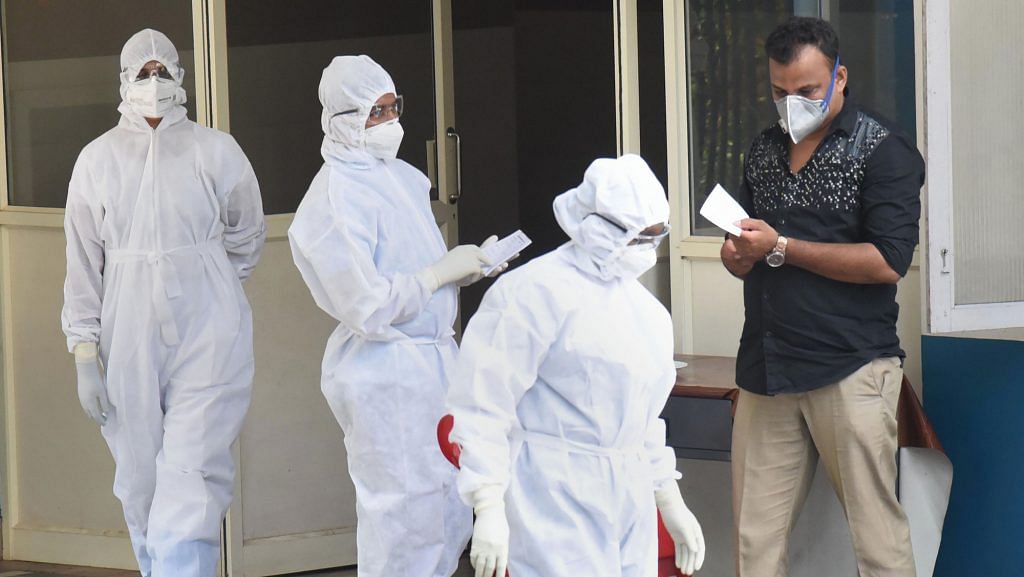New Delhi: In the third week of March, Mumbai-based diagnostic chain Metropolis Healthcare informed its team of phlebotomists — experts at drawing blood apart from collecting urine, stool or saliva samples of patients for laboratory tests — they will soon start collecting swab samples straight from the mouths of suspected Covid-19 patients.
While the majority of the staff, 60 out of 110, were already adept at collecting samples for the H1N1 influenza (swine flu), according to the company, the coronavirus is far more infectious and testing patients for it in the middle of a pandemic is an altogether different challenge.
“When we made this announcement, they were all anxious and also feared for their lives. They asked several questions to calm their nerves but then, not a single phlebotomist backed out,” said Vishal Toraskar, section head, Lab@Home, Metropolis Healthcare.
He said some of the main concerns were what would eventually happen if they get the infection, what would happen to their families if they die, how could they ensure their own safety, and should they be staying with their families.
Similar questions were raised when the Gurugram-headquartered testing lab chain SRL Diagnostics informed its staff.
Both chains, which received approval for testing from the apex health research body, the Indian Council of Medical Research (ICMR), on 21 March — are training their staff to ensure their own safety.
The fears are not unfounded. According to the George Institute for Global Health, India, “Front-Line Health Workers (FLHW) will be at an increased risk of Covid-19, even in the course of their normal activities.”
“FLHWs will experience stigmatisation, isolation and being socially ostracised. Providing psychosocial support, non-performance-based incentives, additional transport allowance, child-care support should be planned. Awards and recognition are required for motivation. Without an active and motivated health workforce, it is difficult to tackle Covid-19,” the institute said in a statement.
Also read: How the novel coronavirus is mutating, and if you should be concerned
Protecting the staff
To ease the nerves among their staff, both chains have resorted to arranging their stay in hotels, providing healthy food, upgrading medical cover, providing additional medical cover for spouses and parents, and providing transport facilities to pick up from and drop at different points.
“We have been answering their questions, which stem from the fear and anxiety about the new challenge. We have arranged their accommodation in hotels and have advised them to consume a hydroxychloroquine tablet,” said Dr Nilesh Shah, group president, Metropolis Healthcare.
On 24 March, ICMR had issued an advisory recommending a schedule of hydroxychloroquine doses for high risk individuals including healthcare workers who are directly in contact with Covid-19 positive cases.
SRL Diagnostics has provided similar facilities to its staff. “We have given an additional medical insurance cover that not just covers the employee but also includes their spouse, dependent parents and children. In any unfortunate case, if any of our employees falls ill due to the Covid-19 strain, all expenses linked to medical treatment will be borne by the company without any fail,” said Varun Mehta, director and head of human resources, SRL.
Mehta said they check the temperature of the ground staff at regular intervals when they come to deposit samples.
Also read: Buying time with Covid- 19 lockdown won’t work. India’s healthcare can’t scale up in 21 days
Helping patients’ families and their own
The staff who go out to collect the samples say they not only have to comfort their families but also of the patients, particularly due to the growing stigma around the disease.
Before entering any household for sample collection, the phlebotomists inform the family of their arrival and then put on hazmat suits. “Many families request us not to tell anyone in their locality that they are being tested for Covid-19,” said Toraskar, the section head at Metropolis.
Another ground staff, Prashad Yadav, a technician with Metropolis Healthcare who visits 12 houses a day, faces multiple questions from family members of patients. “They first want to know if the symptoms of the patient match that of Covid-19. They also want to know how many samples I collect in a day and how many of that turn positive,” he said. “For the first few minutes, I counsel family members that there is nothing to worry and the majority of cases are mild which gets cured.”
Yadav said he also has to assure his family of his well-being. “They worry about me and I keep assuring them that I am taking proper precautions and that the disease will not affect me.”
Satish Rai, a phlebotomist at SRL, spends most of his time in the company’s accommodation in Mumbai and rarely meets his family. “Whenever I am around my family, I am extra careful and follow all the precautionary measures,” he said.
Rai collects samples and transports them to the company’s Goregoan lab, which has an isolated chamber and a separate entry gate, away from the main lab. A similar provision has been made for the firm’s Gurugram-based laboratory.
“As of now, we are using the recommended method where we test through nasopharyngeal and oropharyngeal swabs, taking due precautions,” Rai said. “The samples are collected in a viral transport medium (VTM) to maintain their stability and are further transported in a cold chain.”
Also read: Not just IAS and police, India’s Covid-19 fight must use panchayats and municipalities too
